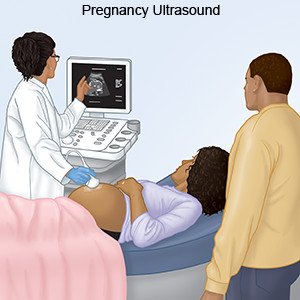Premature Rupture of Membranes
Medically reviewed by Drugs.com. Last updated on Aug 4, 2025.
Premature rupture of membranes (PROM) means your water broke before labor began. PROM may happen just before birth. If PROM happens before 37 weeks of pregnancy, it is called preterm PROM. The cause of PROM is not known.
WHILE YOU ARE HERE:
Informed consent
is a legal document that explains the tests, treatments, or procedures that you may need. Informed consent means you understand what will be done and can make decisions about what you want. You give your permission when you sign the consent form. You can have someone sign this form for you if you are not able to sign it. You have the right to understand your medical care in words you know. Before you sign the consent form, understand the risks and benefits of what will be done. Make sure all your questions are answered.
An IV
is a small tube placed in your vein that is used to give you medicine or liquids.
You may need to wear pressure stockings.
The stockings are tight and put pressure on your legs. This improves blood flow and helps prevent clots.
Medicines:
You may need any of the following:
- Antibiotics help treat or prevent an infection caused by bacteria.
- Oxytocin is used to start contractions and keep them strong and regular. It may be used at any time after your membranes have ruptured.
- Tocolytics are given to stop contractions for a short time if your baby is not ready to be born.
- Steroids are given between 24 and 34 weeks of gestation to help your unborn baby's lungs develop faster.
Tests:
- A fluid sample from your vagina may show if you are leaking amniotic fluid. Fluid samples from your vagina or rectum may be checked for certain infections that can be passed to your baby. If you have preterm PROM, the fluid will be checked for a strep infection.
- Blood and urine tests may show infection or provide information about your and your baby's condition.
- Ultrasound pictures may show the position of your baby and his or her weight. An ultrasound may also show the placenta and the amount of amniotic fluid in your uterus.

Treatment:
- Healthcare providers will monitor you and your baby. You may be on bed rest during this time. Healthcare providers may monitor your baby's heartbeat and the contractions of your uterus. Depending on how far along your pregnancy is, your healthcare provider will decide how to manage your treatment:
- 34 weeks or more: Your baby will be delivered. Vaginal delivery may used if healthcare providers can allow labor to continue naturally. Healthcare providers may wait to see how you and your baby are doing. They may give you medicine to slow contractions, or they may need to induce (start) labor. A C-section may be needed if your labor is not progressing or if your baby has problems, such as a low heart rate. You will be given antibiotics to prevent an infection in you or your baby during the C-section.
- 24 weeks to the end of 33 weeks: You will be put on bedrest. Your healthcare providers will watch and wait for signs of problems or for the labor process to happen naturally. You may need medicine to start labor at a later time. You may also be given steroids to help your baby's lungs develop faster. Medicine may be needed to stop contractions if your baby's lungs are not fully developed.
- Before 24 weeks: Your healthcare provider will discuss with you the best treatment.
RISKS:
- You may get an infection that may spread to your baby or to other parts of your body. The placenta may separate from the walls of your uterus and cause bleeding. This blood loss may be life-threatening for you and your unborn baby. You may need a dilation and curettage (D and C) to remove parts of the placenta from your uterine wall.
- PROM may cause your unborn baby to press on the umbilical cord and cut off his or her blood supply. If your baby is born before his or her lungs are formed, he or she may have trouble breathing, pneumonia, or other lung problems. PROM may cause your baby to have other life-threatening conditions. Your baby may not be in a head-down position, which can make it harder to deliver him or her. You may need a C-section to deliver your baby.
CARE AGREEMENT:
You have the right to help plan your care. Learn about your health condition and how it may be treated. Discuss treatment options with your healthcare providers to decide what care you want to receive. You always have the right to refuse treatment.© Copyright Merative 2025 Information is for End User's use only and may not be sold, redistributed or otherwise used for commercial purposes.
The above information is an educational aid only. It is not intended as medical advice for individual conditions or treatments. Talk to your doctor, nurse or pharmacist before following any medical regimen to see if it is safe and effective for you.
Further information
Always consult your healthcare provider to ensure the information displayed on this page applies to your personal circumstances.
